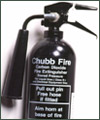 |
There
is no difference in meaning and little or no difference in use.
Chemicals, gases or cloth materials that are flammable /
inflammable catch fire and burn easily. Perhaps, in usage,
cloth materials are usually described as inflammable. So
we might say: 'The material from which these car seats are made
is highly inflammable. And conversely, certain gases or chemicals
may be thought of as flammable. So we might say: 'Aircraft
fuel is highly flammable'. But there are no hard and fast patterns.
All this is somewhat strange, because usually when we add a prefix
such as in- or un- or dis- to the beginning
of adjectives, adverbs and verbs, we give them the opposite meaning.
|
